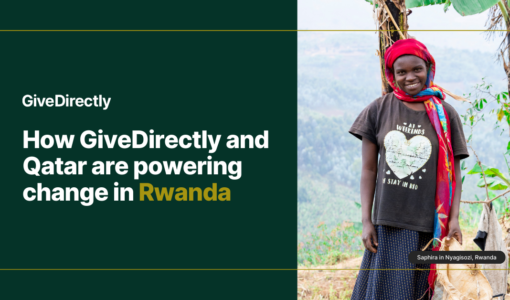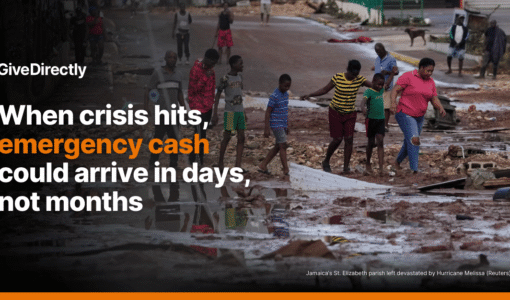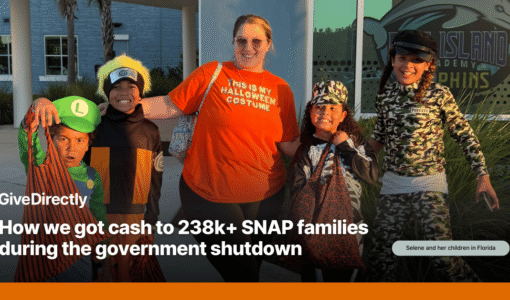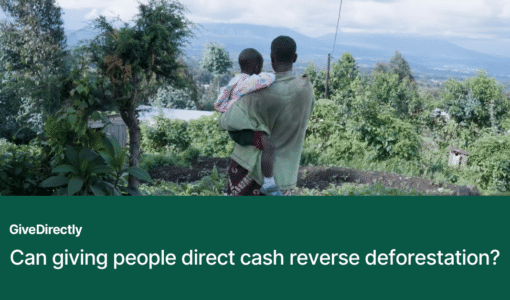Last week, I met with six randomly-chosen recipients from the first villages GiveDirectly enrolled in 2012. We gathered in the home of Joshua, one of the recipients, who had used part of his transfer to build a permanent home for his family. We discussed challenges, goals, and the various ways these recipients had invested their transfers. Three years later, the impact was persistent and palpable. Here are the notes from our conversation:
Participants:
- Bernard, 30 years
- Aloice, 30 years
- Joshua, 27 years
- Jen, 45 years
- Rosemary, 35 years
- Edwin, 37 years
What were your goals before GiveDirectly came?
- Joshua: to mobilize funds to build a better house because other things like educating children depended on having a shelter; used to do casual agricultural work, but challenging because had to use small savings to fend for family
- Bernard: to get a water pump to irrigate his farms (farmer dealing with horticulture)
- Jen: to construct a new house, but because of low income was doing casual jobs within the neighborhood and was not able to build in timeframe she wanted
What is casual labor work like?
- Edwin: full casual labor assignment needs to be done or worker won’t be paid (frustrating and hard)
- Rose: working for people as casual laborer is demeaning (when someone invites you or calls you to repair house it means that they look down upon you; shows that deep inside their heart, they think you are nothing)
- Jen: casual labor is a reflection of poverty and level of suffering you’re going through
What were your biggest challenges?
-
- Joshua: used to be house – thatch leaked and family had to keep on moving from one corner to another when it rained; grass was not ready and had to keep on moving bedding
- Rosemary: she and her children had a problem with where to sleep (never had a mattress or furniture or blankets); also challenges with school fees – before getting GD money, had no hope that children would be able to study beyond standard 8
- Aloice: faced a lot of difficulties including lack of land to settle on independently – wanted to move out and put up an independent home because felt confined and suffocated in dad’s home; had plans of selling his livestock (2 cows) to generate income to buy land
- Bernard: had a small hut to share with family (spouse and 4 children); uncomfortable being squeezed in same room with family
- Jen: used to have grass thatched hut that would leak and thatch would blow away, so always living in danger; bedding and other HH items was a problem
What has changed in your life?
- Edwin: used to rent someone’s motorbike to work as a piki piki driver (400 KSH per day to rent and service bike); after getting the funds, bought a second-hand motorbike (40,000 KSH), which he is now using and has maintained (KHS 500 in profit daily); opened an account at Equity Bank and deposits money every week in account – had a goal of starting a business and wife is now (in Nyangoma – selling soaps, sugar, cereal)
- Jen: grows her own vegetables now and sells them at market vs. doing casual work as she was earlier; before GD, was unable to generate resources, but post-GD is able to save money and lease out land; has been able to maintain practice of leasing land and selling vegetables since 2012; optimistic about the future because she’s now able to earn and depend on herself, though she finds the physical strain of ploughing hard (wishes she had capacity to engage ox plough)
- Aloice: situation has changed, now is doing his own agriculture and no longer works for people; now able to concentrate in farming and produce quite a bit (when he sells, tends to bring in 300 shillings per sale); also did not have to sell his 2 cows and has 4 now
- Rose: can now employ her own people because she farms her own land and also has a business selling mandazi (had always intended to start business before but didn’t have capital)
- Joshua: always comfortable when he comes back home even when it rains, able to sleep soundly and comfortably and even tap water from the roof; family and spouse is happy; other than house, used part of money to train himself as a welder in Siaya town (paid 30,000 KSH for training @ juakali and now works there)
- Bernard: built a new home and is on track to buying a new water pump (costs 25,000 KSH and has saved about 10,000 KSH); besides farming veggies, also trades in charcoal (invested some of transfer in charcoal trade – able to generate 400 KSH per bag which he never could do before, able to sell about 10 sacks in a week)
How hard was the spending decision?
- Rose: when she got money, prioritized building a house but back of her mind knew she wanted to start mandazi business (sells mandazai from home and then goes to Twist market); decision was not hard – she is a widow so consulted her 18-year old son, he helped remind her to also buy some furniture for her house.
- Edwin: had a very easy time making the decision because had been in piki business for many years; sat down with family and agreed that it was a good choice to make; challenge he had was identifying a good motorbike (note: before struggled to get a motorbike on loan from Equity)
- Bernard: struggled a little with decision of buying a pump vs. building a spacious hut – he and his spouse decided on latter and had hopes in the long-run that they’d be able to get the pump; decision to build a good house was the right decision –no longer has to worry about re-thatch etc.
- Joshua: by the time GD came, he had saved about 1K shillings towards his home project; if GD had not come, would have struggled to raise funds; consulted with spouse and mom on spending decision
What do you think of other people’s spending decisions?
- Everyone was surprised people could lift themselves up
- Bernard: surprised that people were able to make decisions about the transfer (knew others’ financial status and didn’t expect people to actually elevate themselves and build homes, buy useful things etc.)
- Edwin: some people in this village, because of poverty levels, had never even touched 10,000 KSH, so was surprised that they would properly use 40,000 KSH (taught him lesson that it’s lack of funds that limit people in these communities)
- Rose: some people after getting the transfer were able to use it, but then stopped and remained where they were; others invested in business and are more optimistic about the future
- Bernard: shares same sentiment that after using money to build a house some have just remained there (still experiencing benefit though because not spending money on thatch and not getting rained on anymore ); thinks impact depends on how prepared individuals were to spend the money, how good their plans were etc.
Which category are you in? (temp or more permanent change)
-
- Rose: she is in the middle somewhere; fairly optimistic – fact that she was able to put one of her daughters through secondary school is a big step, though income that she earns now is not sufficient to take her son to school (worried about her daughter because girls “mature” very fast and so wanted to “contain” in school and prioritize her education over son’s)
- Jen: she is neither down nor up, somewhere in between; able to make a step (no longer working as a casual labor, able to generate her own income); has not met full goals because of a lot of challenges in terms of educating her children and taking care of household (feels like she’s not quite there yet); but biggest stress was house and now feels stress-free and looks forward to the future
- Edwin: considers himself in the category of “most optimistic” because first transfer enabled him to build his statement with the bank, which enabled him to get a loan of 30,00 KSH (topped up with second transfer), which he used to open retail shop; now able to eat well and take care of school fees, looking forward to better future
- Joshua: has made a step forward in his life; now has knowledge of welding and intends to buy a welding machine; optimistic that in a year or so he can buy machine
- Aloice: feels optimistic – having moved out of father’s compound, very optimistic about the future; the livestock he wanted to sell ended up being saved and have multiplied to 4; by the time his first-born child does class 8 exams, should be able to send to secondary school
- Bernard: optimistic that beyond his goal of water pump and also with savings from charcoal trade, he’ll be able to have enough money to lease land to expand tomato farm; the goal feels within reach and he is more relaxed and less stressed because sources of income are varied and he can save some money
Feedback on GD
- Edwin: need to insist on an action plan for every beneficiary (many people “messed up” funds, were not able to reach their goals); wants funds to be contingent on following through with plans; separately, made point that a lot of announcements are made that govt is going to help people but money ends up getting lost; biggest change they’ve ever seen in their life in terms of development is the idea of giving money directly to people
- Joshua: red tape around govt aid (eg. if any help comes through Dsitrict Commissioner, by the time help reaches intended beneficiary, very negligible); GD has beaten red tape and money has reached target
- Rose: there wasn’t any problem – received money, recipients used the money according to their own plans and priorities
- Bernard: echoed what Edwin said – would make sense to put some conditions on recipients (cases where some beneficiaries drank away money despite the fact that they could have used money for livestock)
- Aloice: GD perfect compared to NGOs and govt – many promises made that never reach target (e.g. relief food – announced that target groups will receive given quantity of maize, but by the time reaches there’s very little)
- Edwin: they were utterly surprised that GD was able to meet the promise of delivering cash transfer because other NGOs rarely do that; perceives a changes in village – whole village is flooded with iron rooftops shining everywhere



